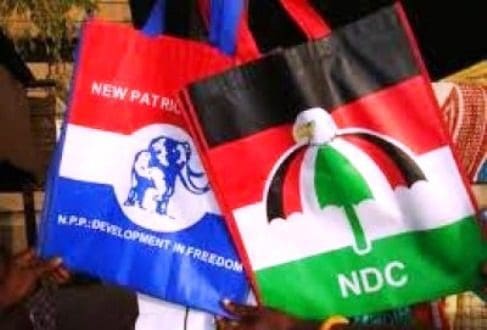A prominent New Patriotic Party (NPP) communicator has launched a scathing attack on the ruling National Democratic Congress (NDC), claiming the government has allowed illegal mining activities to spiral into a national environmental disaster under President John Dramani Mahama’s leadership.
Jones Nyamesem, speaking on Wontumi Television, accused the NDC administration of protecting and enabling galamsey operations through government complicity. “Galamsey has now become a free-for-all under the NDC. Who dares you as a police officer or soldier to stop it when their executives are involved?” he questioned during the television appearance.
The allegations come amid mounting pressure on the Mahama administration to declare a state of emergency over the illegal mining crisis that has devastated Ghana’s water bodies and forest reserves. The Ghana Coalition Against Galamsey has intensified pressure on President John Dramani Mahama to declare a state of emergency in areas devastated by illegal mining, citing over 7,000 excavators causing mass environmental destruction across the country.
Nyamesem highlighted alarming water pollution statistics, claiming turbidity levels in Ghana’s water bodies have increased dramatically within eight months. He stated that turbidity measurements rose from 14,000 to 94,000, describing the situation as unprecedented in Ghana’s environmental history and warning that the country is consuming toxic water resources.
The timing of these accusations carries significant political weight as Ghana approaches critical decision-making periods regarding environmental protection measures. According to IMANI’s Criticality Analysis of Governance and Economic Issues, the pressure now stems from a convergence of environmental, moral, and security concerns, with various stakeholders including religious leaders and farming associations demanding immediate action.
However, policy experts have expressed caution about rushing into emergency declarations. IMANI’s analysis emphasizes the importance of sequencing, balancing the urgency to protect rivers and farms against the need to safeguard rights and build durable governance systems. The think tank warns that emergency powers could entrench existing governance failures if not properly implemented.
The IMANI Foundation has outlined specific concerns about emergency measures, noting that while such powers might yield quick security gains through equipment seizures and forced shutdowns, these victories could prove unsustainable without proper civilian court prosecutions and community engagement strategies.
Current government initiatives include implementing permit-tracking systems for heavy machinery, strengthening chemical use prohibitions, and developing community development agreements. In October 2024, the administration deployed the military across water bodies in the country to crack down on illegal miners under a special “Operation Halt”, though results have been mixed.
The galamsey crisis has emerged as a defining issue in Ghana’s political landscape. IMANI’s analysis points out that although the Vice President’s campaign has emphasized positive narratives, such as technological advancements like the launch of the CitizensApp and other digital initiatives, these gains seem to have been overshadowed by the negative sentiment around galamsey.
Environmental experts estimate the scope of required remediation is massive. Environmental restoration experts estimate that reversing galamsey damage will require restoring 80% of degraded forests and 90% of polluted water bodies, representing a massive undertaking that could define Ghana’s environmental future.
The illegal mining industry represents a significant economic drain on Ghana’s resources. Illegal small-scale mining in Ghana, known as “galamsey” (taken from a slang phrase for “gather and sell”) is estimated to cost Ghana more than $2.3 billion each year in lost revenue and illegal smuggling.
Water pollution from mining activities has rendered major rivers toxic for human consumption. The impact of galamsey has turned River Pra into a toxic stream, rendering it unhealthy for human consumption due to contamination with mercury, cyanide, and other toxic chemicals, while deforestation and soil erosion continue to devastate agricultural lands.
Recent research has documented the health implications of contaminated water sources. Illegal mining activities in Ghana have contaminated water bodies with heavy metals and other toxic substances, rendering them unsuitable for irrigation and livestock watering, contributing to diminished crop yields and food insecurity.
The political parties have proposed different approaches to addressing the crisis. The NDC proposes to apply state-of-the-art technology, including AI, to track all excavators and geo-fence all Small Scale Mining (SSM) concessions in Ghana, while ensuring mining operations avoid water bodies and require proper environmental rehabilitation.
As pressure mounts for decisive action, the debate over emergency powers versus conventional measures continues to divide stakeholders. The protesters specifically called for emergency powers that would enable government to halt all mining operations, conduct comprehensive environmental assessments, and implement lasting solutions before permanent damage occurs.
The controversy reflects deeper questions about governance accountability and environmental protection in Ghana’s democratic system. Critics argue that political will, rather than legal frameworks, remains the primary barrier to effective galamsey enforcement.
With environmental degradation accelerating and public pressure intensifying, the Mahama administration faces critical decisions about balancing economic interests, community livelihoods, and environmental sustainability in addressing what many consider Ghana’s most pressing environmental crisis.
Source: newsghana.com.gh











